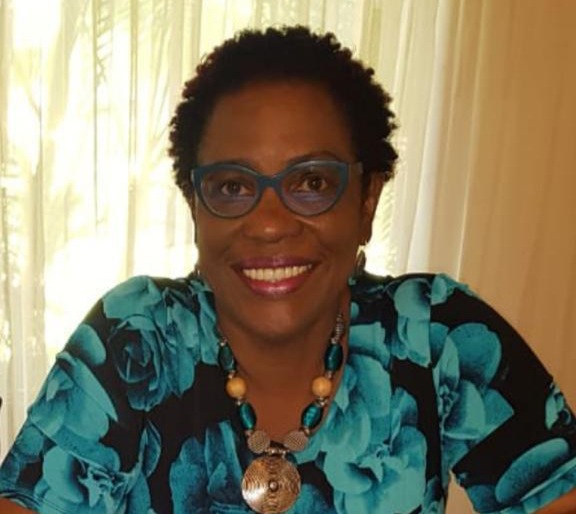
Lead Climate Negotiator, Jamaica. UNFCCC Bureau Vice President 2017-2018
“Woman in charge”. That was a headline in The Gleaner, Jamaica’s national daily, when Una May Gordon took over as the Head of the Climate Change Division in Jamaica’s Ministry of Economic Growth and Job Creation.
Interrupting her Christmas vacation (“that’s how important this Network is to me!”), Una May shared an engaging account of her journey from Consultant for Jamaica’s National Biodiversity Strategy and Action Plan (NBSAP), to becoming the “woman in charge”.
After the NBSAP was done (“too many years ago”), she was asked to rescue the First National Communication to the UNFCCC, which had to be submitted at COP6 in The Hague but had run into trouble. “That was like dangling a carrot in front of me. I said I’ll do it – if I get to go to the COP.” She wanted to go back the Netherlands, where she had done her Master’s in Environmental Sciences majoring in Air Pollution Control, at the University of Wageningen. She got her deal, and 100 copies of Jamaica’s National Communication were duly printed and packed in a duffel bag, in time to accompany Una May to her first COP.
She then attended several other COPs – but not yet as negotiator. “Paris was my turning point. I wasn’t happy with Jamaica’s performance at COP 21 and decided to do something about it.” When the top job for Jamaica’s negotiating team was advertised, she applied and got it. In August 2016. With a COP 22 due in Marrakech in November, a short three months later.
“I knew nothing about how to lead a delegation to COP!” she says with disarming honesty. COP 22 was predictably overwhelming for her. “Suddenly I was the Focal Point for everything! The UNFCCC, GCF, the CTCN… what are all these things?!! When I left Jamaica, the Prime Minister wasn’t coming to Marrakech. When I got to Marrakech, the Prime Minister was coming.” She is grateful to the UNFCCC Secretariat for their support in the days that followed. “They asked me – ‘where will the Prime Minister stay? Who will write his statement?’ I said – I don’t know!!”
Back home after Marrakech, Una May implemented a four-point plan to improve Jamaica’s visibility at the negotiations, and went about hiring a team to help her. “I was very deliberate in the hiring process – I decided that if I hire two officers, then one will be a woman, and the other a man. If I hire two admin staff, one will be a woman, and the other a man.”
Una had already helped set up the Caribbean Institute of Women in Leadership to advance women’s leadership and political participation throughout the Caribbean Region, and knew the stakes were high. She identified the right persons and convinced them to make the move. “When I first asked one of my choices if she wanted to join me, she said ‘I don’t think so, but I will pray about it’.” Una wasn’t settling for prayers. She made an offer that her candidate couldn’t refuse, and hasn’t regretted it since.
Another surprise awaited her after COP22. “Remember Jamaica had expressed an interest to represent the GRULAC region in the Bureau?” a colleague asked her one day. “What Bureau? What is the Bureau? I’m not interested, thank you,” Una May countered. “Maybe not,” said her colleague. “But Jamaica is.”
A short while later, Una May received the letter from the Secretariat inviting her to attend the Bureau meeting in Bonn. “I did everything I could to not have to go – including point out that the German Embassy was closed for a holiday, so I couldn’t possibly get a visa in time.” The German Embassy opened the portal specially to give Una her visa, and she found herself on the flight to Bonn despite her best attempts to the contrary. “I travelled a day-and-a-half to get to Bonn, attended a half-day meeting where I looked from left to right, left to right at the speakers wondering what they were talking about, and then travelled a day-and-a-half to get back home.”
Her incomprehension of the functions of the Bureau was short-lived, and in her role as Bureau member, Una May soon became one of two co-authors of the Code of Ethical Conduct for all participants in the UNFCCC process. When she was put in charge of the Bureau elections, once again she made deliberate attempts to ensure that more women joined.
Her confidence as a leader, both at home and in the international process, grew in leaps. Una May has chaired several UNFCCC negotiations, and while she often participates in the nitty-gritty, her main interest is in making sure the governance of the UNFCCC process is fair. “Women are clearly underrepresented in the process, but a lot of their work also goes unnoticed, and they are sometimes disrespected,” she says.
She is convinced the Women Climate Leaders Network can make a difference. “The Network can become a force in the negotiations. When you know people are behind you, your attitude can be very different. The Network should take the same deliberate approach I have always adopted, scouting for potential women leaders, mentoring them, and telling them they can do this.”